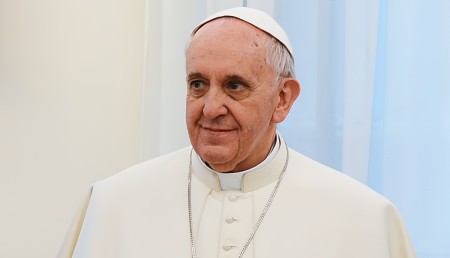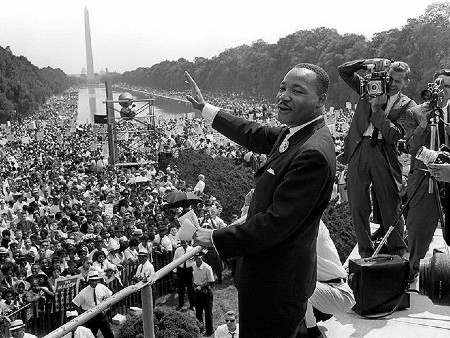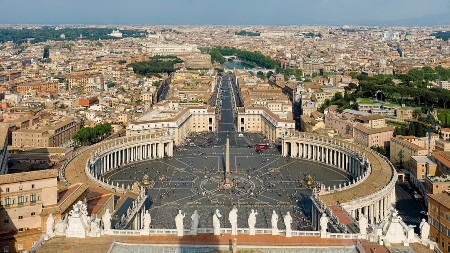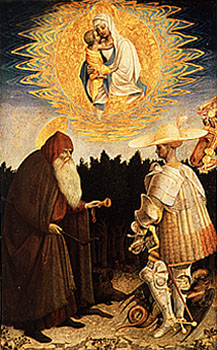Randall Terry on 'Faithful Catholic Citizenship'
FREE Catholic Classes
A long time leader in the fight to protect children in the womb, Randall Terry, now a Catholic convert, weighs in on "Faithful Catholic Citizenship."
Highlights
A Humble Plea (www.ahumbleplea.com/)
10/29/2008 (1 decade ago)
Published in Politics & Policy
WASHINGTON, DC (A Humble Plea) - Note from Randall Terry, Author: This brochure is for Catholics who desire to vote in a manner that best reflects our Catholic Faith. The teaching of the Church herein quoted comes directly from our late Holy Father, John Paul II, as declared in Evangelium Vitae, unless otherwise noted.
1) Can we vote for a candidate for "the common good" of society on various issues, if the candidate is pro-choice?
John Paul II states:"Laws which authorize and promote abortion and euthanasia are therefore radically opposed not only to the good of the individual but also to the common good; as such they are completely lacking in authentic juridical validity. Disregard for the right to life, precisely because it leads to the killing of the person whom society exists to serve, is what most directly conflicts with the possibility of achieving the common good. 72 It is impossible to further the common good without acknowledging and defending the right to life, upon which all the other inalienable rights of individuals are founded and from which they develop...101 (Emphasis added)
Answer: No. We cannot vote for a pro-choice candidate even if our motive is the pursuit of "the common good" of society on other issues.
2) Does the Church teach that Abortion and Euthanasia are murder?
John Paul II states concerning abortion:"The moral gravity of procured abortion is apparent in all its truth if we recognize that we are dealing with murder and, in particular, when we consider the specific elements involved. The one eliminated is a human being at the very beginning of life.58 Athenagoras records that Christians consider as murderesses women who have recourse to abortifacient medicines, because children, even if they are still in their mother's womb, 'are already under the protection of Divine Providence'. Among the Latin authors, Tertullian affirms: "It is anticipated murder to prevent someone from being born; it makes little difference whether one kills a soul already born or puts it to death at birth..." 61(Emphasis added)
John Paul II states concerning euthanasia:"...euthanasia is a grave violation of the law of God, since it is the deliberate and morally unacceptable killing of a human person. This doctrine is based upon the natural law and upon the written word of God, is transmitted by the Church's Tradition and taught by the ordinary and universal Magisterium. Depending on the circumstances, this practice involves the malice proper to suicide or murder. Suicide is always as morally objectionable as murder."65 66 (Emphasis added)
Answer: Yes. The Church teaches that abortion and euthanasia are murder.
3) Are we required as Catholics to work to overturn Roe vs. Wade, and restore the protection of law to the unborn in the U.S.?
John Paul II declares: "The legal toleration of abortion or of euthanasia can in no way claim to be based on respect for the conscience of others, precisely because society has the right and the duty to protect itself against the abuses which can occur in the name of conscience and under the pretext of freedom..." 71 "The doctrine on the necessary conformity of civil law with the moral law is in continuity with the whole tradition of the Church." 72 "As 'a firm and persevering determination to commit oneself to the common good', solidarity also needs to be practised through participation in social and political life...Serving the Gospel of life thus means...to ensure that the laws and institutions of the State in no way violate the right to life, from conception to natural death, but rather protect and promote it." 93 (Emphasis added)
John Paul II said to American Bishops: "An essential feature of support for the unalienable right to life, from conception to natural death, is the effort to provide legal protection for the unborn...Catholics, and especially Catholic legislators, must continue to make their voices heard in the formulation of cultural, economic, political, and legislative projects...in which the lives of all are defended and enhanced. ...In defending life you are defending an original and vital part of the vision on which your country was built. America must become, again, a hospitable society, in which every unborn child and every handicapped or terminally ill person is cherished and enjoys the protection of the law." (6, Address of John Paul II to American bishops during an ad limina visit to Rome, October, 1998. Emphasis added.)
Answer: Yes. We we required as Catholics to work to overturn Roe vs. Wade, and restore the protection of law (i.e., make abortion illegal) in the U.S.
4) Can we use our conscience to go beyond abortion and euthanasia, and vote for a pro-choice candidate for other "issues" and "proportionate reasons" such as the war, health care, immigration, the economy, etc.?
John Paul II states: "But God cannot leave the crime [of murder] unpunished: from the ground on which it has been spilt, the blood of the one murdered demands that God should render justice (cf. Gen 37:26; Is 26:21; Ez 24:7-8). From this text the Church has taken the name of the "sins which cry to God for justice", and, first among them, she has included willful murder...for this reason whoever attacks human life, in some way attacks God himself." 9
"Among all the crimes which can be committed against life, procured abortion has characteristics making it particularly serious and deplorable. The Second Vatican Council defines abortion, together with infanticide, as an "unspeakable crime". But today, in many people's consciences, the perception of its gravity has become progressively obscured. The acceptance of abortion in the popular mind, in behaviour and even in law itself, is a telling sign of an extremely dangerous crisis of the moral sense, which is becoming more and more incapable of distinguishing between good and evil, even when the fundamental right to life is at stake. Given such a grave situation, we need now more than ever to have the courage to look the truth in the eye and to call things by their proper name, without yielding to convenient compromises or to the temptation of self-deception. 58 (Emphasis added)
John Paul II, again speaking to American Bishops, states: "As Pastors, you must make every effort to ensure that there is no dulling of consciences regarding the seriousness of the crime of abortion, a crime which cannot be morally justified by any circumstance, purpose, or law." (3, ad limina address, October 1998, emphasis added.)
Answer: No. We cannot in the name of "conscience" or "proportionate reasons" ignore or go beyond abortion and euthanasia for other "issues" such as the war, health care, immigration, the economy, etc. This would be "self-deception." These other issues are not greater than or even equal to the intrinsic evils of abortion and euthanasia. Our consciences are not ours to form as we think best; they must be formed by the Laws of God and the teachings of the Church, not personal political preference.
"Proportionate reasons" would not properly apply here, because one Presidential candidate is stridently pro-abortion, while other candidates are committed to overturn Roe vs. Wade and make child-killing illegal again. Hence, no authentic "proportionate reasons" could balance ending the murder of innocent children by abortion with arguments about just or unjust war, the care of the poor, the economy, etc.
Moreover, the first litmus test of "proportionate reasons" is that the act one takes (i.e., voting) be intrinsically morally good or intrinsically morally neutral. Proportionate reasoning fails in this election, because voting for a candidate who supports murder - while other candidates have pledged to curtail or end it - cannot be viewed as an intrinsically morally good or neutral act. The act (a person's vote) would itself be an act that aids in child-killing, rather than curtailing or ending it. (Proportionate reasoning would properly apply if we faced two pro-abortion candidates, and through our vote we sought to mitigate the damage one would do over the other.)
5) Is voting for a pro-choice candidate in this election "cooperating formally with evil" and therefore a morally grave act?
John Paul II states: "... it is necessary to recall the general principles concerning cooperation in evil actions. Christians...are called upon under grave obligation of conscience not to cooperate formally in practices which, even if permitted by civil legislation, are contrary to God's law. Indeed, from the moral standpoint, it is never licit to cooperate formally in evil. Such cooperation occurs when an action, either by its very nature or by the form it takes in a concrete situation, can be defined as a direct participation in an act against innocent human life or a sharing in the immoral intention of the person committing it. 74 (Emphasis added.)
Answer: Yes. Voting for a pro-choice candidate in this election is "cooperating formally with evil," and therefore a morally grave act, because he (the voter) would have "direct participation in an act" (voting) that would result in laws and actions "against innocent human life." Therefore it is a morally grave act to cooperate with a candidate who has stated his intention to murder the unborn or the victims of euthanasia.
6) Can a Catholic vote in good conscience for a pro-choice candidate in this Presidential election?
John Paul II states: "In the case of an intrinsically unjust law, such as a law permitting abortion or euthanasia, it is therefore never licit to obey it, or to 'take part in a propaganda campaign in favour of such a law, or vote for it'". 73
Answer: No. A Catholic cannot vote in good conscience for a pro-choice candidate in this Presidential election. With our federal government, we do not vote for laws; we vote for lawmakers who make laws in our stead. Given the histories and intentions of pro-abortion candidates to continue the legalized killing of the unborn, to vote for them is to knowingly participate in their evil acts and intent; it puts them in a position to kill more children, and is therefore to vote for abortion itself.
7) Are certain Catholic clergy and laymen correct when they declare: "[I]t violates no aspect of Catholic teaching for a Catholic Voter to endorse, support, or vote for Barack Obama..."? (Doug Kmiec, Catholic Attorney, Can a Catholic Support Him?)
John Paul II states: "When a parliamentary or social majority decrees that it is legal, at least under certain conditions, to kill unborn human life, is it not really making a "tyrannical" decision with regard to the weakest and most defenseless of human beings? Everyone's conscience rightly rejects those crimes against humanity of which our century has had such sad experience. But would these crimes cease to be crimes if, instead of being committed by unscrupulous tyrants, they were legitimated by popular consensus?" 70
John Paul II instructed American Bishops on this very principle, saying: "As Bishops, you must continue to draw attention to the relationship of the moral law to constitutional and positive law in your society:"Laws which legitimize the direct killing of innocent human beings...are in complete opposition to the inviolable right to life proper to every individual; they thus deny the equality of everyone before the law... Dear Brother Bishops, Catholic moral teaching is an essential part of our heritage of faith; we must see to it that it is faithfully transmitted, and take appropriate measures to guard the faithful from the deceit of opinions which dissent from it...May your fidelity to the Lord and the responsibility for his Church which he has given you make you personally vigilant to ensure that only sound doctrine of faith and morals is presented as Catholic teaching." (ad limina address, 6, 7)
Answer: No. They are not correct. Endorsing, supporting, or voting for Obama in the 2008 Presidential election flagrantly violates Catholic teaching.
The late John Paul II - who spoke infallibly on morals as the Vicar of Christ and the Successor of St. Peter - declared abortion is "murder," a "crime against humanity," a "tyrannical" act that in some way "attacks God Himself;" abortion is an "unspeakable crime" in which the blood of the victims "cry to God for justice." Moreover, "civil law" concerning abortion must conform to "the moral law" - "You shall not kill;" laws permitting abortion are "radically opposed to the common good;" we must work to assure that "every unborn child...enjoys the protection of law," and it is "never licit" to "participate in a propaganda campaign in favor of it (abortion), or to vote for it."
Therefore to proclaim that it "violates no aspect of Catholic teaching for a Catholic Voter to endorse, support, or vote for Barack Obama..." (Doug Kmiec) is clearly absurd. Obama shamelessly supports child-killing by abortion for all nine months of pregnancy for any reason; Obama defends partial birth abortion and infanticide after a failed abortion; Obama is committed to keeping this crime against humanity "legal;" and he promised to sign "The Freedom of Choice Act" as soon as he is elected.
In the light of the Gospel of Life quoted faithfully in this document - which is the teaching of the Catholic Church - and in the light of the history and intent of Obama, to suggest that voting for him is a valid expression of Catholic morality is clearly error, false teaching, and treachery against the Gospel of Life. As John Paul II warned - this is an attempt to mislead "the faithful" with "the deceit of opinions which dissent" from the clear teaching of the Church.
8) Can a Catholic vote for Obama in good conscience?
Answer: No. Given this "concrete situation," with this set of objective facts, a Catholic cannot vote for Obama in good conscience.
Who should you vote for? You have several valid options. You may even choose to write in a candidate. But you may not in good conscience, given this "concrete situation," vote for Barack Obama if you want to be a "Faithful Catholic Citizen".
*******
Compiled and edited by Randall Terry, Founder, Operation Rescue on September 29, Feast of St. Michael and St. Gabriel: "Oh Glorious Warrior, Oh Faithful Messenger, give us the grace to fight courageously and speak faithfully for the Innocent. Amen."
Join the Movement
When you sign up below, you don't just join an email list - you're joining an entire movement for Free world class Catholic education.

-

-
Mysteries of the Rosary
-
St. Faustina Kowalska
-
Litany of the Blessed Virgin Mary
-
Saint of the Day for Wednesday, Oct 4th, 2023
-
Popular Saints
-
St. Francis of Assisi
-
Bible
-
Female / Women Saints
-
7 Morning Prayers you need to get your day started with God
-
Litany of the Blessed Virgin Mary
Daily Catholic
 Daily Readings for Friday, January 17, 2025
Daily Readings for Friday, January 17, 2025 St. Anthony the Abbot: Saint of the Day for Friday, January 17, 2025
St. Anthony the Abbot: Saint of the Day for Friday, January 17, 2025 Prayer for a Blessing on the New Year: Prayer of the Day for Tuesday, December 31, 2024
Prayer for a Blessing on the New Year: Prayer of the Day for Tuesday, December 31, 2024- Daily Readings for Thursday, January 16, 2025
- St. Fursey: Saint of the Day for Thursday, January 16, 2025
- St. Theresa of the Child Jesus: Prayer of the Day for Monday, December 30, 2024
![]()
Copyright 2024 Catholic Online. All materials contained on this site, whether written, audible or visual are the exclusive property of Catholic Online and are protected under U.S. and International copyright laws, © Copyright 2024 Catholic Online. Any unauthorized use, without prior written consent of Catholic Online is strictly forbidden and prohibited.
Catholic Online is a Project of Your Catholic Voice Foundation, a Not-for-Profit Corporation. Your Catholic Voice Foundation has been granted a recognition of tax exemption under Section 501(c)(3) of the Internal Revenue Code. Federal Tax Identification Number: 81-0596847. Your gift is tax-deductible as allowed by law.










 Daily Readings for Friday, January 17, 2025
Daily Readings for Friday, January 17, 2025 St. Anthony the Abbot: Saint of the Day for Friday, January 17, 2025
St. Anthony the Abbot: Saint of the Day for Friday, January 17, 2025 Prayer for a Blessing on the New Year: Prayer of the Day for Tuesday, December 31, 2024
Prayer for a Blessing on the New Year: Prayer of the Day for Tuesday, December 31, 2024

